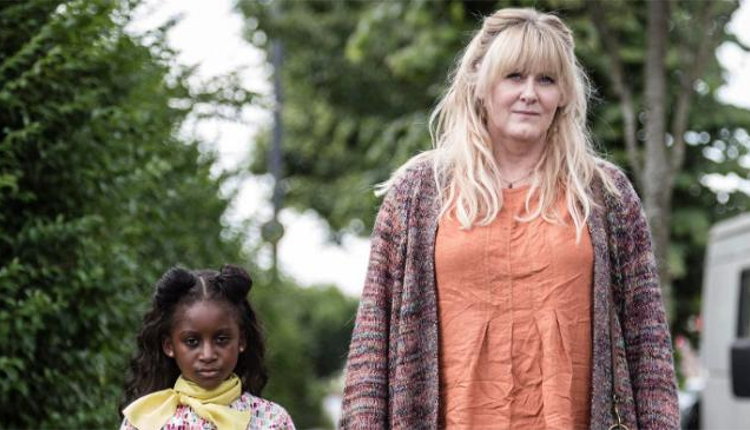TV Review | Murder Mystery Kiri Breathes New Life into a Tired Genre
Often crime mysteries use real-world issues as backdrop. The detective trying to uncover a murder, for example, may stumble into a web of corporate or political corruption, a community rife with simmering misogyny and/or a hotbed of racial tension. That said, few incorporate societal issues into the narrative as directly as Kiri, the latest from writer Jack Thorne (National Treasure, The Last Panthers, Glue). Focusing on the timely topic of interracial adoptions in the UK, Happy Valley’s Sarah Lancashire stars as social worker Miriam. One of her cases, among many involving recovering drug addicts, troubled teens and abusive parents, involves the impending adoption of the titular character, a nine-year-old black girl.
Kiri (Felicia Mukasa) is to be adopted by the Warners (Steven Mackintosh, Lia Williams), a white middle-class family. However, to make the transition smoother, Miriam suggests the child should be allowed an unsupervised visit with her biological grandfather, Tobi (Lucian Msamati, a highlight of Tom Hardy’s underrated Taboo). Despite concerns regarding Kiri’s ex-convict drug dealing birth father, who is allegedly estranged from his family, the Warners agree. Kiri thinks it is right too, on the way to visit stating: “I’m black. I need to find out how black people live”.
Thorne is a master at maximising the intrigue of a situation while also building very fascinating characters.
Tragedy strikes, however, when Kiri goes missing and is found dead. As a detective (Wummi Mosaku) tries to uncover the circumstances of the child’s murder, Miriam comes under fire for perceived negligence.
After one episode, it’s unclear whether Kiri will be a murder mystery or a drama centring around the death of an innocent child trapped between two racial worlds (the trailers for the second episode hint a mix of both). Either way, Thorne is a master at maximising the intrigue of a situation while also building very fascinating characters. For example, Miriam is such an interesting figure, projecting a natural warmth in conversations with Kiri, fellow social workers and most hilariously fellow dog walkers (the latter a moment which helps the story from becoming overwhelmingly grim). However, there are heavy shades of darkness to her character. We learn that her son died of cancer when he was a teen and that she is divorced. Meanwhile, her morning ritual of adding a splash of vodka to her coffee and where she finds herself as the credits roll hint that her apparent optimism may be façade.

The vodka also raises interesting questions regarding Miriam’s capability to work. Was she negligent? Although she does appear to care for those she helps – becoming friends with them and buying them food – did she take her foot off the wheel? Her boss tells her: “99 percent of the time you are exceptional but there are times where you follow your own judgement”. Miriam responds to these criticisms by claiming they are false and her social care organisation’s way of throwing her to the wolves; in an episode filled with fantastic dialogue her retort was a highlight: “You like that percentage, don’t you? Stick a Flake in it and try sell it to the tabloids, why don’t you?” However, there is that lingering question. Was Kiri’s death caused by her recklessness, perhaps brought on by drink or was it fair of Miriam to think Tobi had disowned the child’s father?
It also could be that Miriam let the colour of Kiri’s skin cloud her judgement. The child’s adoptive parents accuse the social worker of prioritising Kiri’s cultural needs over her safety, a means of ‘ticking’ her ‘lefty boxes’. Could this be true? These questions, along with the more conventional but equally compelling mysteries regarding what exactly happened to Kiri and why Tobi granted his ‘chaotic’ son access to the girl, will have viewers tuning in for the next three installments. By crafting a crime story where the main focus is not on a police officer or journalist but a social worker, Thorne has bred new life into the increasingly tired genre.
Kiri airs on Channel 4

